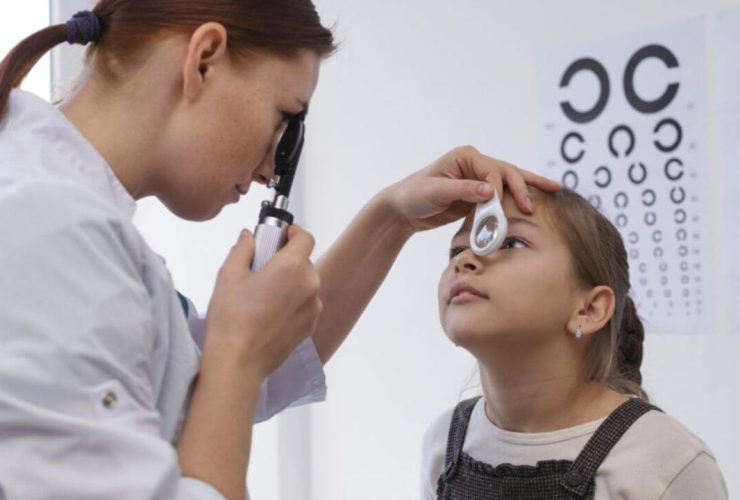Common Myths About Eye Care: Insights from Professional Opticians
Eye care is surrounded by many misconceptions that people have and believe to be fact. Believing in such misconceptions can cause your eyesight to suffer. From your daily routines to your foods, the misconceptions about eyesight care run deep. Professional opticians say that it’s critical to differentiate between fact and fiction in protecting your eyesight. Let’s debunk a few common myths regarding eye care and shed some light on taking care of healthy eyes.
Common Myths About Eye Care
Some of the common myths are as follows:
Myth 1: Reading in Dim or Warm Light Damages Your Eyes
Many assume that reading in poor light will destroy eyesight forever. It can cause strain or annoyance but not long-term loss of eyesight. Your eyes can tire out following extended readings in poor lighting, but resting and proper lights can correct the problem. Opticians say to use proper lights for reading in a room. It saves strain, but don’t avoid it at all costs.
Myth 2: Sitting Close to the TV May Ruin Your Vision
The myth has run deep for many years, particularly with kids who enjoy television shows a lot. Sitting near the television can cause eye strain but doesn’t cause long-term eyesight complications. Needing to sit nearby can sometimes mean an undiagnosed refractive flaw, such as short-sightedness. Optician consultation can correct the flaw and give your eyes a healthy life. Good care for your eyes involves knowing your routines and taking expert consultancy when necessary.
Myth 3: Eating Carrots Can Fix All Your Eyes Problems
Almost all people believe that since carrots are high in vitamin A, eating them can cure poor eyesight. Unfortunately, carrots will not quite help you in this manner. Other substances, like omega-3 fatty acids, lutein, and zinc, are also vital for good vision. Carrots alone aren’t enough. Opticians have already established that diet is only part of maintaining good eyesight. Other factors include treatment and regular eye exams. They maximise vision. Sure, carrots can help, but they do not cure all of the problems.
Myth 4: Your Eyes Can Get Weaken by Wearing Glasses
A common misconception is that spectacles lead to dependency and, if used for a long time, may cause the eyes to weaken. In contrast, glasses are made to help people see clearly so that they do not have difficulties looking and doing things during the day. In short, spectacles aim to enhance a person’s situation and not to reason for their impairment. Therefore, professionals will always suggest the use of corrective glasses. Indeed, straining the eyes is a common ailment nowadays, but the use of well-fitted glasses soothes the eye muscles.
Myth 5: Eye Exercises Regularly eliminates Glasses Use
Eye exercises are regularly promoted as a non-invasive method to eradicate the need to wear glasses. However, the truth is they are limited and may be capable of curing some specific problems, but they will never correct vision issues such as myopia, hyperopia, or astigmatism. Opticians stress the importance of treating these problems the right way, for instance, by using prescribed glasses or having surgery, for which they are the only ways to manage them. Goggles or a mask can bring ppl relief, but it is not advisable to ignore professional treatments.
Myth 6: Children Don’t Need Eye Exams Unless They Have Problems
Many parents believe that their child’s eyes must be okay unless they complain about them. Nevertheless, kids don’t always realise that they have vision impairment. There must be routine eye tests for early detection of complications even when symptoms don’t arise. Opticians prefer to schedule tests in order to follow eye development and overall eye health. Intervention at an early stage can avert complications and promote effective learning and development.
Myth 7: If You Don’t Have Symptoms, Your Eyes Are Healthy
Some believe that so long as they don’t have symptoms, their eyes become perfectly healthy. Nevertheless, most eye complications, such as glaucoma or diabetic retinopathy, occur without symptoms in the early stages. Optician routine tests can identify such complications before they become extreme. Preventative care helps keep eyes healthy and keeps complications at bay. You must not wait for symptoms to act.
Conclusion
Consenting to such myths holds off proper care and creates unnecessary complications. Caring for your eyes necessitates proactive processes that involve routine check-ups, a healthy diet, and proper glasses. Dispelling such misconceptions is a big step towards a thorough understanding of your eye requirements. Consult expert opticians for proper information and personalised guidance.
For reliable professionals, go to Carlton & Stanley Opticians, who care most about your eyes. Prioritise your eyes today and witness for yourself the impact of expert care.



